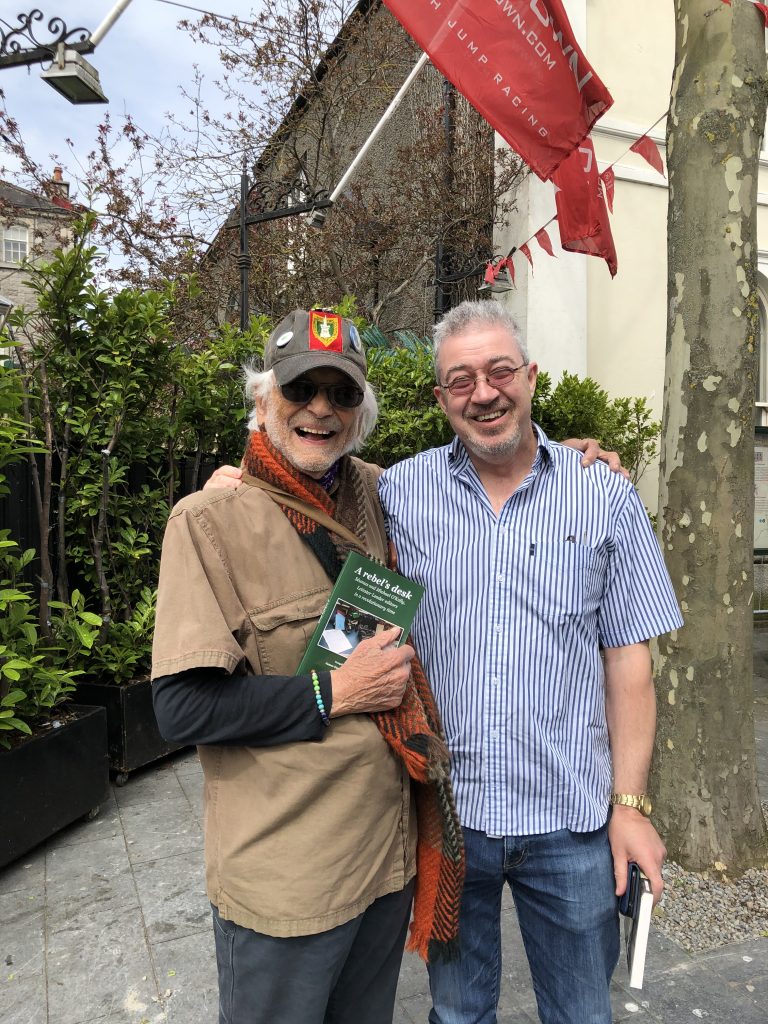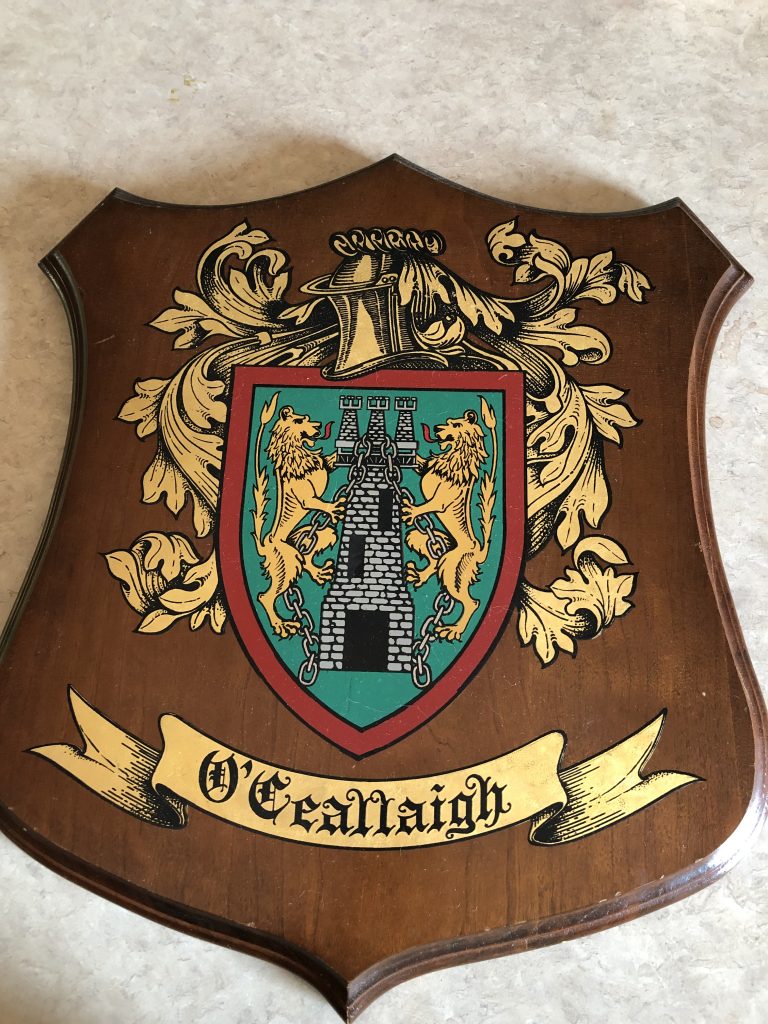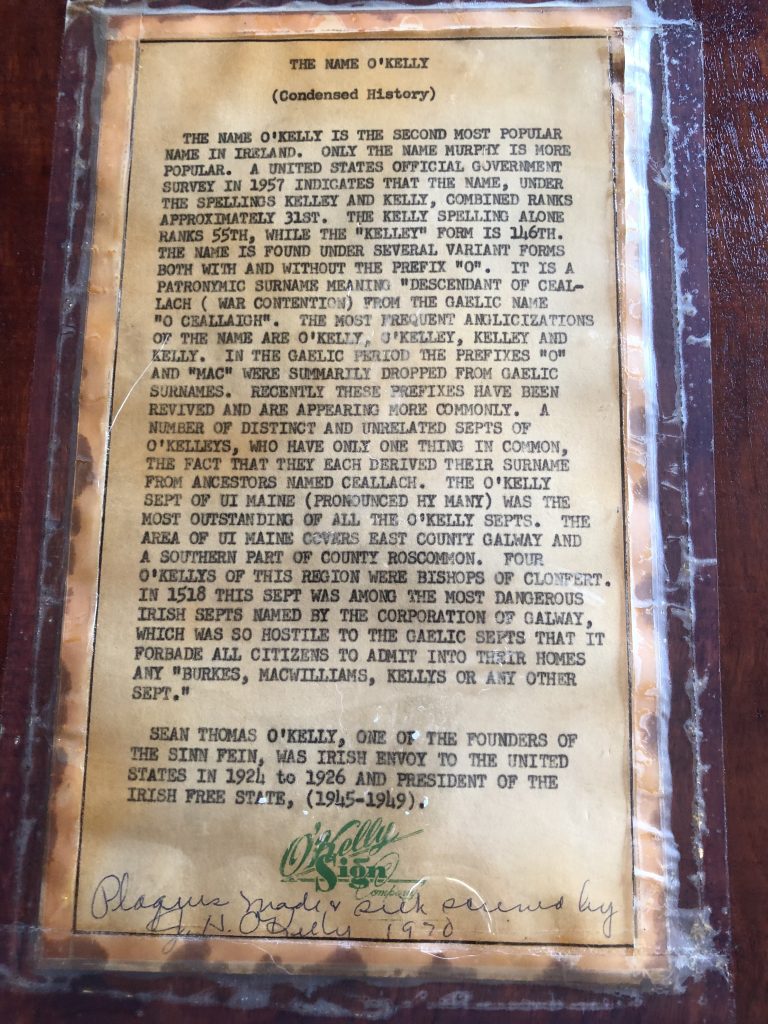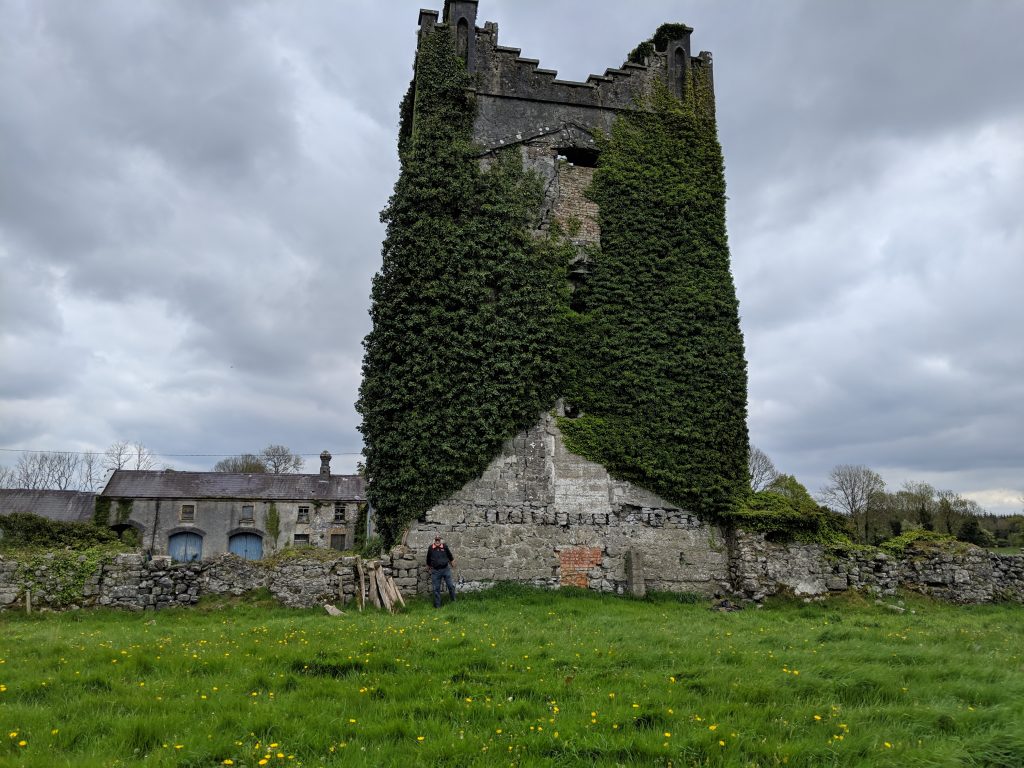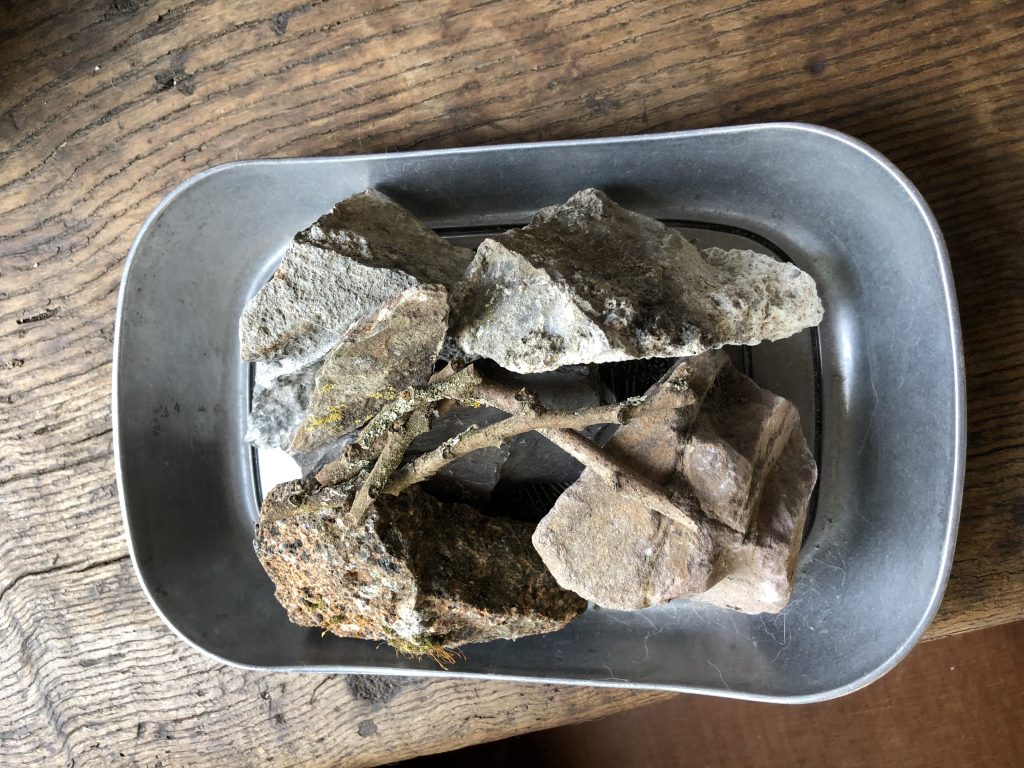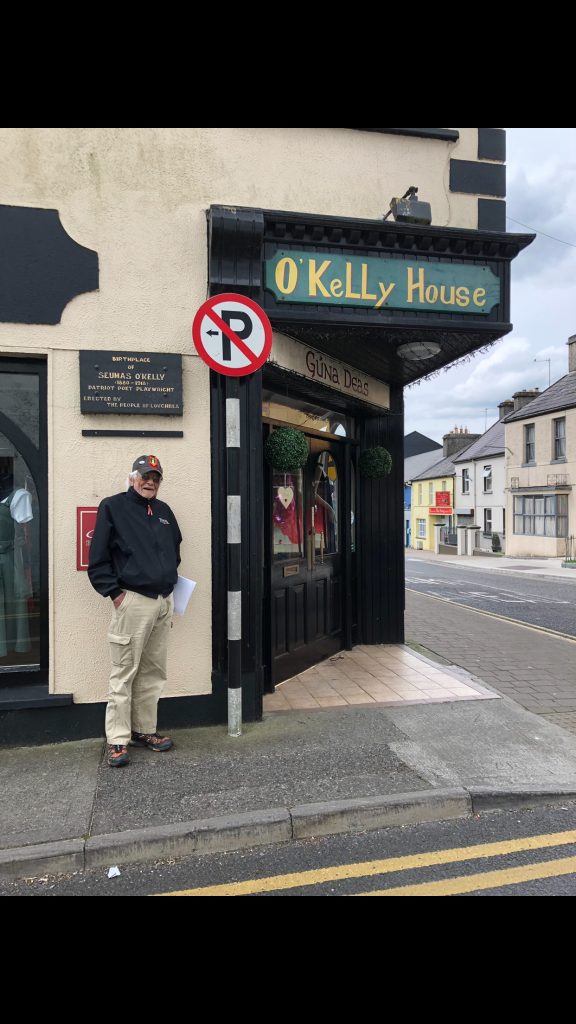
Can’t recall when I first discovered James Durney’s writings (see them in note below) on the internet of the O’Kelly brothers — Michael and Seumas. What galloped my fancy was that Michael O’Kelly of Ireland and Michael O’Kelly of WV were born on the same 18th day of February –he in 1873 and me in 1934. The brothers were Kellys until both recaptured the “O’” between the census years of 1901-1910, which historian Durney confirmed to me — “to become more Irish and Nationalistic.” Seems Michael was 34 when he made the change. The census report of 1910, showed the family history of the brothers father, Miceal Ua Ceallaig (72 at the time) with a family history as “newsagents” and “journalists.” The major accompanying photo to this article is THE O’KELLY HOUSE at Mobhill in Loughrea. Co., Galway, where they were born. (My daughter, Karen, took this one of me during our May visit in 2019.) I thought there was going to be a plaque for both Michael and Seumas, but only for Seumas, three years the younger, but, indeed, the most famous for his plays and poetry. Both shared the world of journalism, however, particularly as shared Editorship of the Leinster Leader. Both were rebels for the cause of nationalism against the Crown’s occupation of Ireland. Each chose the pen rather than the sword for the fight for the dream of an independent Irish Identity. — While Michael was briefly in prison, Seumas took the Editor’s desk in Dublin. On November 13, 1918 a mob invaded the building and Seumas, age 42 (with a heart condition from rheumatic fever since 1911), defended himself with his cane, but collapsed with a hemorrhage and died that evening. Michael lived longer and died 19 December 1955, age 82. Seamus has many photos, portraits, but only one photo of Michael has survived.( on page 66 of A REBEL’S DESK). But living longer, it was he who would write the history of their journalistic work — including connections with the Irish Republican Brotherhood, Sinn Fein, and the I.R.A. — covering the first 22 years of the 20th century of Ireland’s resistance and freedom. — So, there were two Michael O’Kelly’s with the same birth date sharing the planet from 1934 to 1955. [Any others who qualify for such a club, by whatever names — let me know.]
Now, for a bit of history, which I can say is hopefully almost correct: at least enough so to convey the message of the O’ the brothers took and I was born with. First a comment on the other attached photos below. The first two are of the wooden Crest plaque, front&back (15”W/161/2” L), my father made in 1970. Never asked how he got the copy pasted on the back. Found so many variations since. Then the photo of the remains of an O’Kelly Hy Many castle outside of Monivea in Galway area. Beside it is my photo of collected stone pieces, from that castle and its accompanying storage-facility: also a few stones and branches from Blarney Castle to form the “obvious” connection. Then there’s me with James Durney in Naas.
Now to the real “O’” of it all. Well some, because this will not be a historical summary of Britain’s many attempts to dominate and annihilate the Irish by occupation, terror, genocide, and starvation — so many “troubles” over time. Seems, the Ua and Ui refer to decendents of the Ceallaig’s ( “contentious “–“bright-headed”) — howsoever plural or singularly conceived. [ Hear the O sound in the Ur/Ui — Grandson of — seems the most usual designation: and there was that accent mark above the O — perhaps the origin of the apostrophe.] Irish surnames were created during the 11th and 12th centuries and the “O” perhaps even before say some sources. In time, the O replaced the U’s — becoming, it seems, a “signature” of the Gaelic Irish Nation. When Elisabeth I took the Crown ( 1558-1603), she rigorously imposed English rule and the new protestant Anglican faith — taking over the land and controlling the Gaelic clans and signature forms such as the “O’” in surnames. Then, there was a revival of the Gaelic tongue and the “O’s” in the later 1800’s. It was also a time of famine and hunger — and immigration (which the British were glad to encourage).
One of those immigrants, as the 1800’s began, was Hugh Payton Laurenting O’Kelly from Dublin, Ireland. He left his study for the Priesthood, goes the story, and landed in the Carolinas, married, and was recorded as a practicing country doctor of medicine around 1832 in Morgantown, WV. His son Bernard started the lineage of children leading to me. Such is all of that family history needed here. This concentration is on these two particular “O’s” over time with the same name and birthdate.
Ireland had always had a full history of writers and poets — so I’ve no need, being one myself, to seek a genealogical connect with these brothers. Not my intent or need. [But, I bet there is to some degree.] However, the spiritual connect is very real to me. The integrity of identity, the authenticity of authorship, and the courage to fight for the promises of freedom and personal destiny — are such that I would have joined then in taking the “O.” I would have joined Hugh in keeping it in the new land for the same reasons. (I’m sure all would encourage my keeping the (‘) as discussed below.)
So, what is to be made of this random coincidence of the synchronization of these two Michael O’Kellys? I don’t see an opening through the Os that solves one riddle of existence. Furthermore, of the two I’m the only one made privy to this entanglement. Indeed, if we keep following the right trails we will find the treasures to be found. And I found a most engaging excuse to make a trip to Ireland. It was wonderful. Things are astir again with Northern Ireland and the Brexit issue. Surely no one wants any more “troubles” and border issues due to separate monies: all of which plays hard-ball, again, with Britain’s role in the North of the Irish nation. I was delighted to see all the public signs — highways, localities, streets, etc. — in both Gaelic and English. Truly, the Irish won the war with the Crown.
I’ll conclude with a tidbit of a tale I’ve already detailed in my book ALTARPIECES (pp. 177-.183) Had I not been born with and lived with — not just an O — but an O APOSTROPHE, I doubt I would have created the nom de plume of ‘APO’KSTROPHES’ ( with three apostrophes). Surely, the bothers, Hugh and I, had we the chance would have much serious fun discussing this. The story of O is one story; but seems another’s to be told of the “ ‘ “ apostrophe. O the poetries of it all! The digital world is trying to eliminate it with replacement impositions such as — O'K … and similar variations on that theme. No binary attack on possessives, contractions, or commas — just O forms as this O’K with its apostrophe. Connecting the past’s erasures of the O’ with today’s gobbledygook — now that’s excuse enough for another trip to Ireland to source it out. Wonder if I can talk Karen and Sean into chauffeuring me on another one. Exploring options. For now, I call forth the spirits of Michael-Seumas-Hugh to fight for the continuation of the O and its “apostrophe.” This is a new task for the rebel’s poetry desk. But first to finish my 101 Collected Poems by ‘Apo’kstrophes’. (aka – Michael D. O’Kelly ) –mdok–8/8/19
[Books by James Durney: A REBEL’S DESK — Seumas and Michael O’Kelly, Leinster Leader editors in a revolutionary time (2016)—– and —- FOREMOST AND READY — Kildare and the 1916 Rising (2015): both Naas Printing/Print Irish. — Many thanks to James for the brief tour of Naas and the places where the brothers lived and worked. I had to find Mobhill on my own.]
